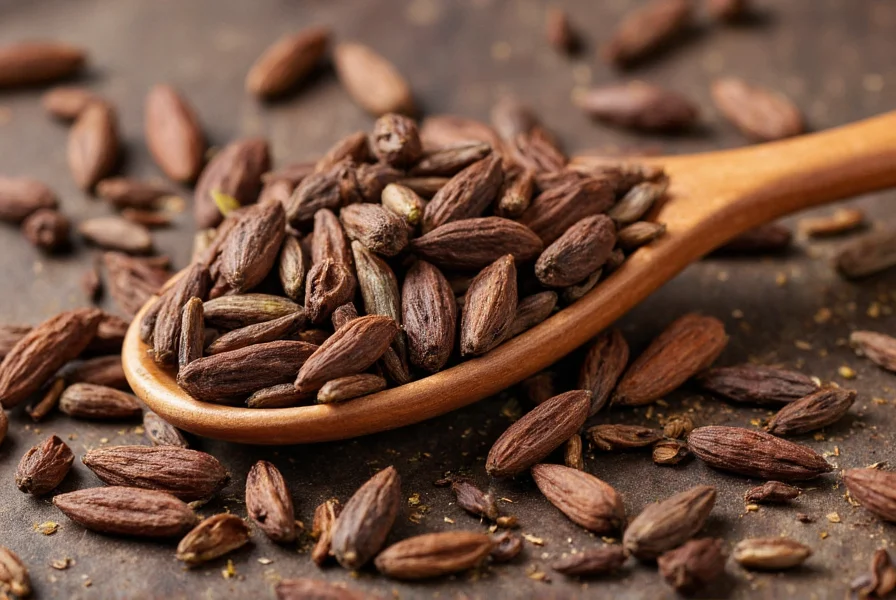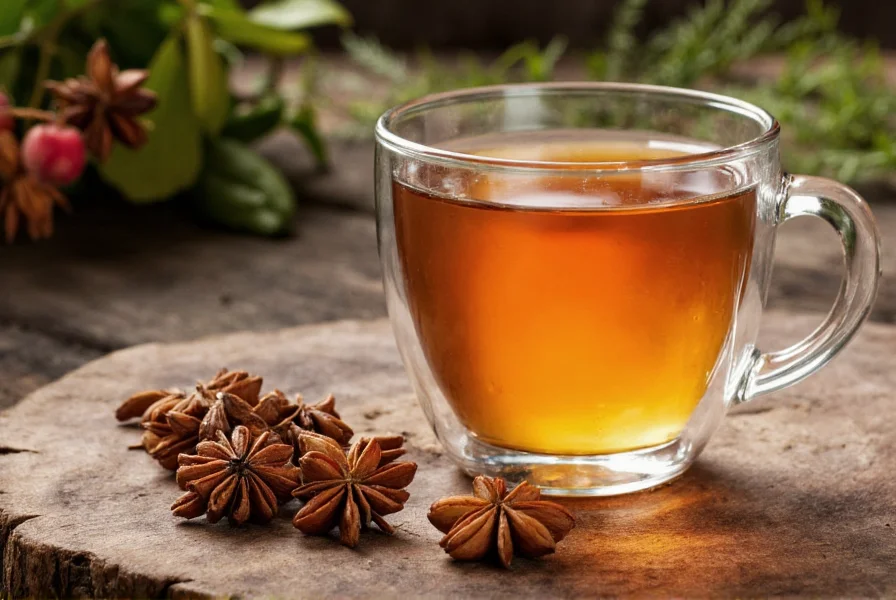Anise tea has been enjoyed for centuries across Mediterranean and Middle Eastern cultures, valued both for its pleasant flavor and traditional medicinal uses. This caffeine-free herbal tea offers a natural alternative for those seeking digestive relief or a soothing beverage without stimulants. While often confused with star anise tea, true anise tea comes specifically from the Pimpinella anisum plant, a flowering herb in the Apiaceae family that's closely related to carrots, celery, and parsley.
Understanding True Anise Tea
Many consumers mistakenly use the terms "anise" and "star anise" interchangeably, but these come from completely different botanical sources. True anise (Pimpinella anisum) produces small, grayish-brown seeds that contain 1.5-3% essential oil, primarily composed of anethole (80-90%). Star anise (Illicium verum), by contrast, comes from a Chinese evergreen tree and contains similar compounds but also potentially harmful substances like shikimic acid.
| Characteristic | True Anise Tea | Star Anise Tea |
|---|---|---|
| Botanical Source | Pimpinella anisum (annual herb) | Illicium verum (evergreen tree) |
| Primary Compound | Anethole (80-90% of essential oil) | Anethole plus shikimic acid |
| Flavor Profile | Sweeter, milder licorice note | Stronger, more intense licorice flavor |
| Traditional Regions | Mediterranean, Middle East | China, Vietnam |
Evidence-Based Health Benefits of Anise Tea
While traditional medicine has long recommended anise tea for various ailments, modern research provides more nuanced insights into its potential benefits:
Digestive Support
A 2020 review published in Phytotherapy Research analyzed multiple studies on anise's digestive effects. Researchers found that anethole, the primary compound in anise tea, demonstrates antispasmodic properties that may help relax gastrointestinal muscles. This explains why many people report relief from bloating, gas, and mild indigestion after consuming anise tea. The review noted that while promising, most studies were small-scale and more rigorous clinical trials are needed.

Respiratory Relief
Anise tea's expectorant properties make it a traditional remedy for coughs and respiratory congestion. A clinical trial involving 100 participants with acute bronchitis found that those who consumed anise tea twice daily experienced significantly reduced cough frequency compared to the control group. The tea's anti-inflammatory effects likely contribute to this benefit, though researchers caution it shouldn't replace medical treatment for serious respiratory conditions.
Hormonal Balance
Some research suggests anise may have mild phytoestrogenic effects. A study in Gynecological Endocrinology found that women with menstrual discomfort who consumed anise tea daily for three cycles reported reduced severity of cramps and other symptoms. However, the mechanism isn't fully understood, and individuals with hormone-sensitive conditions should consult healthcare providers before regular consumption.
How to Make Authentic Anise Tea
Preparing proper anise tea requires attention to detail to maximize flavor and potential benefits:
- Measure ingredients: Use 1-2 teaspoons of crushed anise seeds per 8 ounces of water
- Heat water: Bring fresh, filtered water to just below boiling (195-205°F or 90-96°C)
- Steep properly: Pour water over seeds and steep covered for 5-7 minutes
- Strain: Use a fine mesh strainer to remove all seed particles
- Enhance (optional): Add lemon or honey to taste, but avoid boiling honey to preserve its properties
For stronger medicinal effects, some traditional preparations call for gently crushing the seeds before steeping to release more essential oils. However, extended steeping beyond 10 minutes can create an overly intense, almost medicinal flavor that many find unpleasant.
Safety Considerations and Potential Side Effects
Anise tea is generally recognized as safe for most adults when consumed in moderate amounts. However, certain precautions should be noted:
- Allergic reactions: Individuals sensitive to plants in the Apiaceae family (carrots, celery, parsley) may experience allergic reactions
- Pregnancy concerns: While traditionally used to support lactation, high doses may stimulate uterine contractions; pregnant women should consult healthcare providers
- Medication interactions: Anise may interact with certain medications metabolized by CYP enzymes, including some blood thinners
- Estrogen-sensitive conditions: Those with conditions like endometriosis or certain cancers should use caution due to potential phytoestrogen effects
The European Medicines Agency recommends a maximum daily intake of 200mg of anise essential oil, which translates to approximately 2-3 cups of properly prepared tea. Consuming excessive amounts may cause nausea, vomiting, or pulmonary edema in sensitive individuals.

Scientific Research Status
While laboratory studies show promising results regarding anise's antioxidant, antimicrobial, and anti-inflammatory properties, human clinical trials remain limited. Most existing research comes from small-scale studies in specific populations. The National Center for Complementary and Integrative Health notes that "there is insufficient evidence to support the use of anise for any specific health condition," though it acknowledges traditional uses and preliminary research findings.
Researchers emphasize that anise tea should be viewed as a complementary approach rather than a replacement for evidence-based medical treatments. Those with chronic digestive issues, respiratory conditions, or hormonal imbalances should consult healthcare professionals rather than relying solely on herbal remedies.
Conclusion
Anise tea offers a flavorful, caffeine-free beverage option with potential digestive and respiratory benefits supported by both traditional use and emerging scientific research. When properly prepared from authentic anise seeds, it provides a distinctive licorice-like flavor without the stronger compounds found in star anise. While generally safe for most adults in moderate consumption, individuals with specific health conditions or taking certain medications should exercise caution. As with any herbal remedy, managing expectations about its effects is crucial—it's a supportive wellness beverage rather than a medical treatment.
Frequently Asked Questions
What's the difference between anise tea and star anise tea?
True anise tea comes from Pimpinella anisum seeds, while star anise tea comes from the fruit of the Illicium verum tree. Though both contain anethole (giving the licorice flavor), they're botanically unrelated. Star anise contains additional compounds like shikimic acid and has a stronger flavor. True anise has a sweeter, milder taste and is more commonly used in Mediterranean traditions.
Can anise tea help with digestion?
Research suggests anise tea may provide mild digestive support due to its antispasmodic properties. The compound anethole helps relax gastrointestinal muscles, potentially reducing bloating and gas. A 2020 review in Phytotherapy Research noted promising but limited evidence, emphasizing that while many people find relief, it shouldn't replace medical treatment for chronic digestive conditions.
Is anise tea safe during pregnancy?
While traditionally used to support lactation, pregnant women should exercise caution with anise tea. Some compounds may stimulate uterine contractions in high doses. The European Medicines Agency recommends limiting consumption during pregnancy. Always consult your healthcare provider before consuming herbal teas during pregnancy, especially if you have a history of pregnancy complications.
How much anise tea can I safely drink daily?
For most adults, 2-3 cups of properly prepared anise tea daily is considered safe. This aligns with the European Medicines Agency's recommendation of no more than 200mg of anise essential oil per day. Excessive consumption (more than 5-6 cups daily) may cause side effects like nausea or allergic reactions in sensitive individuals. Those with specific health conditions should consult healthcare providers for personalized guidance.











 浙公网安备
33010002000092号
浙公网安备
33010002000092号 浙B2-20120091-4
浙B2-20120091-4